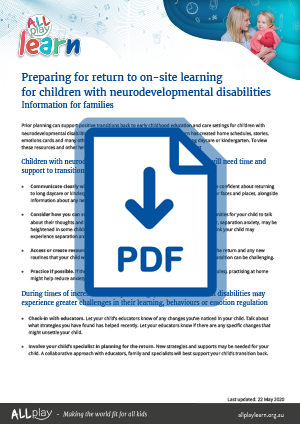
Preparing for return
to on-site learning
On this page:
- Support transitioning to long daycare or kindergarten
- Support with learning, behaviours and emotion regulation
Some children may need time and support to transition back to on-site learning. Some children who may particularly benefit from preparation and planning for their return include children with autism, ADHD, anxiety, intellectual disabilities, or children with additional learning needs, as well as any children who are known to find transitions challenging. Families may consider the following strategies to support children with positive transitions.

Children will need time and support to transition back to long daycare or kindergarten.
- Communicate clearly with your child about what to expect. Your child may feel more confident about returning to long daycare or kindergarten if they know what to expect. Looking at photos of familiar faces and places, alongside information about any new routines may also help with the transition.
- Consider how you can support your child's psychological well-being. Create opportunities for your child to talk about their thoughts and feelings about the return. Various types of anxiety, in particular, separation anxiety, may be heightened in some children. Speak to educators to develop a plan for drop-off if you think your child may experience separation anxiety.
- Access or create resources. Access or create visual schedules and social stories about the return and any new routines that your child will learn. Use positive language while acknowledging that the transition can be challenging. AllPlay Learn's transitioning from home to ECEC settings page may be helpful.
- Practice if possible. If there are new skills your child may need (e.g. new handwashing rules), practicing at home might help reduce anxiety when they return.

During times of increased anxiety and change, some children may experience greater challenges in their learning, behaviours or emotion regulation.
- Check-in with educators. Let your child’s educators know of any changes you’ve noticed in your child. Talk about the strategies you have found helpful recently. Let your child's educators know if there are any specific changes that might unsettle your child, such as new drop off and pick up routines.
- Involve your child’s specialist in planning for the return to onsite learning. New strategies and supports may be needed for your child. A collaborative approach with educators, family and specialists will best support your child’s transition. AllPlay Learn’s parent guide to parent-educator meetings may be a good starting point for these discussions.
- Children have had a long break from the noisy and busy sensory environment of their school or early childhood education and care setting. Children who find sensory experiences challenging or who experience school-related anxiety, may find some of these sensations more challenging than they had earlier in the year. Consider preparing your child for the return by gradually increasing their exposure to sensory input and social situations (e.g. organise a catch up with childcare/kindergarten/school friends) in a COVID-safe way.

